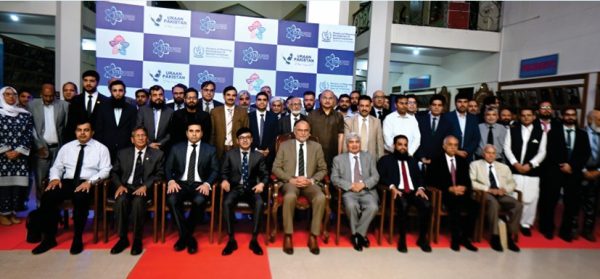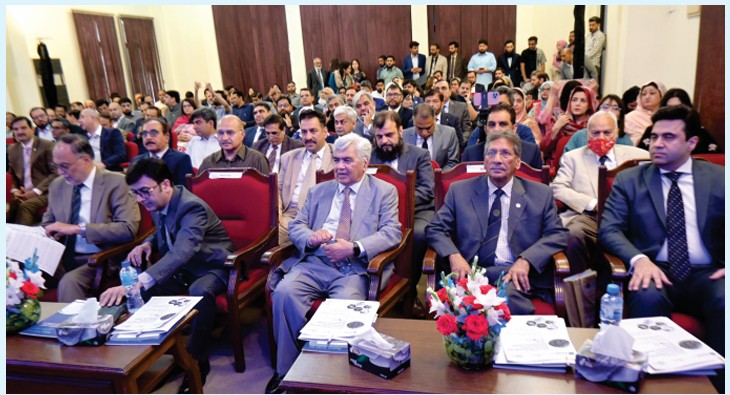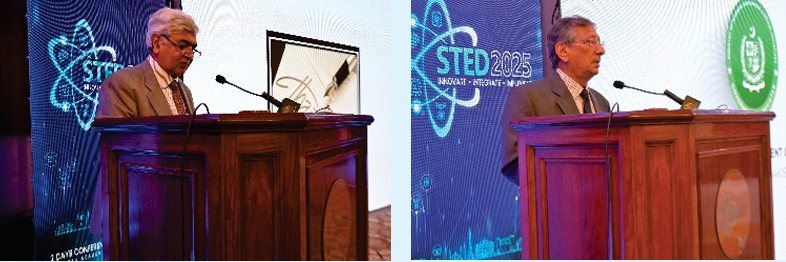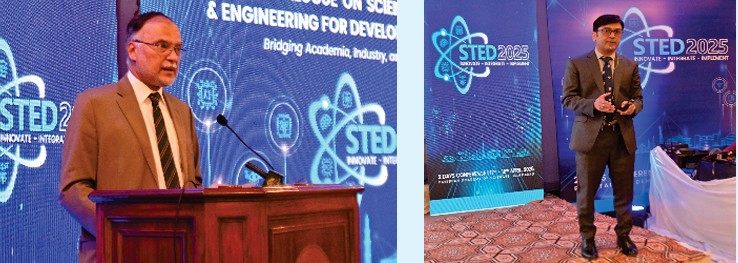Policy Dialogue on “Science, Technology, and Engineering for Development (STED)-2025: Innovate, Integrate and Implement” (April 17-18, 2025)

Pakistan Academy of Sciences (PAS) in collaboration with the Ministry of Planning Development and Special Initiative (MoPDSI), Government of Pakistan (GoP), organized the Policy Dialogue titled: “Science, Technology, and Engineering for Development (STED)-2025: Innovate, Integrate and Implement”, under the URAAN Pakistan Program, from April 7-8, 2025 at the PAS Auditorium, Islamabad. URAAN Pakistan is a transformative initiative by MoPDSI designed to spotlight and advance crucial projects and reforms set forth in the 5Es National Economic Transformation Plan. The strategy aims to rejuvenate Pakistan’s economy, promote sustainable development, and drive inclusive growth.
Prof. Dr. Aslam Baig (Secretary General, PAS) delivered the welcome address at the inaugural session of the policy dialogue and welcomed the conference delegates and participants. Prof. Dr. Kauser Abdulla Malik (President, PAS) also shared his thoughts on the importance of effective collaboration between Industry, Academia, and Government to strengthen Pakistan’s research and innovation ecosystem. Dr. Najeeb Ullah Marwat (Member Science & Technology) shared insights into how innovation and science-led development are shaping economies around the world and how STED 2025 is not just a roadmap, but a catalyst for Pakistan’s leap into a future powered by innovation, collaboration, and sustainable development. Prof. Ahsan Iqbal (Minister for Planning, Development & Special Initiatives of Pakistan) was invited as the Chief Guest at the occasion. In his inaugural address, Prof. Ahsan Iqbal mentioned that Pakistan stood at a critical crossroads and asserted that the nation’s future hinged not on the abundance of natural resources but on its capacity to generate, harness and apply knowledge and “We are not here to tinker with the status quo. We are here to transform Pakistan into a techno-economy”. He urged a national pivot toward realigning Pakistan’s science, technology and engineering (STE) infrastructure with its development ambitions. “Pakistan now must reclaim its intellectual heritage not by looking backwards with nostalgia, but by moving forward with urgency, vision, investment and action. In today’s global race, nations are not competing over oil and gas, they are competing over talent, ideas, innovation and technology.” Prof. Iqbal pointed to global models including South Korea and Singapore that rose to economic prominence through strategic investments in research, innovation and human capital. He also highlighted that “Today’s global competition is not about oil and gas. It’s about skills, technology, and the ability to innovate”.
About 150 scientists, academicians, scholars, industrialists, and policymakers attended the event physically and or virtually. Over the course of two days, the dialogue focused on 19 thematic areas, ranging from biotechnology and AI to energy, health, and climate resilience, offering practical and strategic recommendations to advance national priorities in science and innovation.
The main objective behind the organization of this policy dialogue was to unite leading international and national experts, academicians, researchers, policymakers, and industrial professionals to exchange knowledge, research findings, and practical solutions to address Pakistan’s most pressing developmental challenges by leveraging science, technology, and engineering. Guided by the vision to Innovate – Integrate – Implement, STED aimed to develop a complete innovation value chain, connecting academia, industry, government, and entrepreneurship to collectively drive sustainable economic growth and knowledge-based development.



